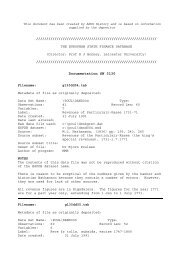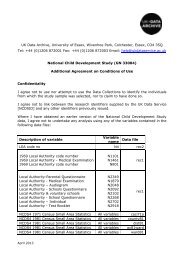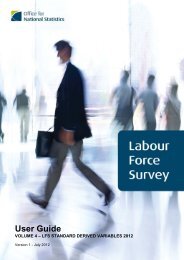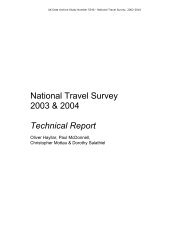ESDS Annual Report, 2008-2009
ESDS Annual Report, 2008-2009
ESDS Annual Report, 2008-2009
Create successful ePaper yourself
Turn your PDF publications into a flip-book with our unique Google optimized e-Paper software.
<strong>ESDS</strong> Management<br />
Effective delivery of <strong>ESDS</strong> relies on <strong>ESDS</strong> Management<br />
taking a strategic lead in relationships with<br />
stakeholders and providing overall direction and<br />
management for the service. <strong>ESDS</strong> Management is<br />
hosted by the UK Data Archive.<br />
Advisory Committee<br />
One of the most important routes through which<br />
<strong>ESDS</strong> Management carries out its strategic role is by<br />
working closely with the <strong>ESDS</strong> Advisory Committee,<br />
which is composed of a range of individuals and<br />
representatives of bodies concerned with the supply<br />
and use of social science data. The people on this<br />
Committee during <strong>2008</strong>-<strong>2009</strong> are listed on the<br />
inside of this report.<br />
The current Chair of the Advisory Committee is<br />
Audrey Brown from the Department of Children,<br />
Schools and Families (DCSF) and the Vice-Chair is<br />
John Curtice, from the University of Strathclyde. The<br />
Committee normally meets twice a year (October<br />
and March). The first of these meetings in <strong>2008</strong>-<strong>2009</strong><br />
was preceded by a ‘scene setting session’ designed to<br />
look ahead to the forthcoming mid-term review . This<br />
session was initiated by an international perspective<br />
from Myron Gutmann, then Director of the Interuniversity<br />
Consortium for Political and Social Research<br />
(ICPSR). Several themes emerged during the session,<br />
helping to steer the Committee’s subsequent thinking<br />
and discussion. Amongst the most critical of these<br />
themes is the need for better integration of services<br />
for researchers and educators; the need to balance<br />
confidentiality with accessibility of data; and the need<br />
for international co-operation.<br />
Impact<br />
One overarching theme which emerged during<br />
<strong>2008</strong>-<strong>2009</strong> was the need for <strong>ESDS</strong> to demonstrate<br />
its social and economic impact, especially in light of<br />
the mid-term review at which the ‘added value’ of<br />
the service will be carefully scrutinised. The March<br />
<strong>2009</strong> Advisory Committee meeting was extremely<br />
useful in this regard with many helpful suggestions<br />
for demonstrating this impact although, as the Vice-<br />
Chair pointed out in his comparison between <strong>ESDS</strong><br />
and a power station, there are limits to how it can be<br />
measured by the use to which its products are put!<br />
Myron Gutmann offered a helpful international view,<br />
stressing that <strong>ESDS</strong> should be valued firstly, for the<br />
academic activity that it engenders, secondly, for its<br />
influence on policy outcomes and thirdly, for its use in<br />
teaching. He also suggested the institution of a prize<br />
for the best student essay based on <strong>ESDS</strong> resources.<br />
International alliances<br />
In May <strong>2009</strong>, <strong>ESDS</strong> was well represented at the annual<br />
conference of the International Association for Social<br />
Science and Information Service and Technology<br />
(IASSIST) and International Federation of Data<br />
Organizations for the Social Sciences (IDFO), held this<br />
year at Tampere in Finland. <strong>ESDS</strong> Management and<br />
UK Data Archive technical staff have also participated<br />
in several meetings of an alliance including data<br />
archives from Australia and the USA which are<br />
working together to make best use of the latest Data<br />
Documentation Initiative (DDIv3.0).<br />
Multi-site working<br />
Close co-operation between the UK Data Archive,<br />
Mimas and CCSR remains essential for the<br />
effectiveness of <strong>ESDS</strong>, and this is facilitated by regular<br />
meetings of staff. The <strong>ESDS</strong> Senior Management<br />
Team (SMT) hold regular quarterly meetings<br />
alternating between London and Manchester to<br />
address key planning issues. These meetings also allow<br />
Manchester-based <strong>ESDS</strong> staff to meet and discuss<br />
issues of concern with the Director. Specific ‘taskfocused’<br />
teams also meet virtually, both according<br />
E C O N O M I C A N D S O C I A L DATA S E RV I C E A N N UA L R E P O RT AU G U S T 2 0 0 8 – J U LY 2 0 0 9 2 1<br />
www.esds.ac.uk

















